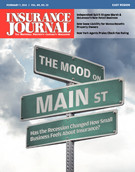“Is it true that if I don’t shovel the snow then I can’t be sued?” As inevitably as the seasons change, this is a question that comes up every fall. For many years, my answer was both lengthy and confusing since it was based on what has long been known in Massachusetts as the “natural accumulation rule.”
The explanation goes like this. The first person to walk on the snow can’t sue you, assuming it just fell. However, the second person might be able to sue you if the snow changed when the first person walked on it. Based on this, my advice has always been quite simple: “Shovel the snow.”
But then in July 2010, the Supreme Judicial Court of Massachusetts changed my answer, making it no longer valid. I can now clearly state: “No, it’s not true.”
For a long, long time, Massachusetts property owners couldn’t be held liable for injuries resulting from a slip and fall on snow and ice unless a plaintiff could prove the ice and snow was an “unnatural accumulation.”
As you might imagine, the distinction between “natural” and “unnatural” accumulations of ice and snow made it exceedingly difficult for plaintiffs to prevail in such cases.
However, in the case of Papadopoulos v. Target Corp.and another, the Supreme Judicial Court abolished this rule.
What does this change mean for property and business owners this winter and the winters that follow? First, everyone needs to know what the court has stated creates a liability for injuries due to ice and snow. Second, there is the issue of a property owner’s duty when it comes to ice and snow removal.
Obligations
The court said that a property owner’s obligation as to ice and snow is now the same as with any other potential danger. In other words, a property owner must act reasonably, taking into account the chance that someone may get hurt, the severity of the injury that person might suffer and the burden of removing or reducing the risk that someone might get hurt.
Simply put, what do business and property owners have to do to avoid being sued? The answer to that question is up to a jury.
However, the court has not left the answer totally up in the air. It provided at least some guidance to help us determine whether or not a property owner acted reasonably. First, there is the issue of foot traffic. Second, the level of potential risk. And, finally, the burden or cost of removing the snow and ice.
The court offered several examples, including the owner of a single-family home, an apartment house owner, a storeowner and the owner of a nursing home to differentiate the duties involved. That’s not all, however, since the court did not specifically enumerate the duties.
What all this suggests is that owners now need to apply to the outside of their establishments the same care and documentation that they have been applying to the inside of their places of business for years.
For example, supermarkets should maintain sweep logs and have managers conduct checks of the store to document that the floors are clean and safe for customers. Other retailers should use the same or similar methods to substantiate the safety of their stores.
This winter, employees should be assigned the task of putting on a coat and patrolling the parking lot. To make their job easier, remember the three “S’s” starting with the winter of 2011: shovel, sand and salt. While plowing may be appropriate, it’s not enough. Constant vigilance of parking lots and walkways is now required.
There’s more. As important as removing snow may be, along with sanding and salting, documenting the actions taken to counter the dangerous conditions posed by ice and snow is equally important.
And, by the way, we’re not starting with a clean slate: the Supreme Judicial Court’s ruling is retroactive. In other words: the new ruling also applies to anyone who fell last winter.
Topics Property Massachusetts
Was this article valuable?
Here are more articles you may enjoy.


 Chubb CEO Greenberg on Personal Insurance Affordability and Data Centers
Chubb CEO Greenberg on Personal Insurance Affordability and Data Centers  AIG, Chubb Can’t Use ‘Bump-Up’ Provision in D&O Policy to Avoid Coverage
AIG, Chubb Can’t Use ‘Bump-Up’ Provision in D&O Policy to Avoid Coverage  Lawyer for Prominent Texas Law Firm Among Victims ID’d in Maine Plane Crash
Lawyer for Prominent Texas Law Firm Among Victims ID’d in Maine Plane Crash  Zurich Insurance’s Beazley Bid Sets the Stage for More Insurance Deals
Zurich Insurance’s Beazley Bid Sets the Stage for More Insurance Deals 


